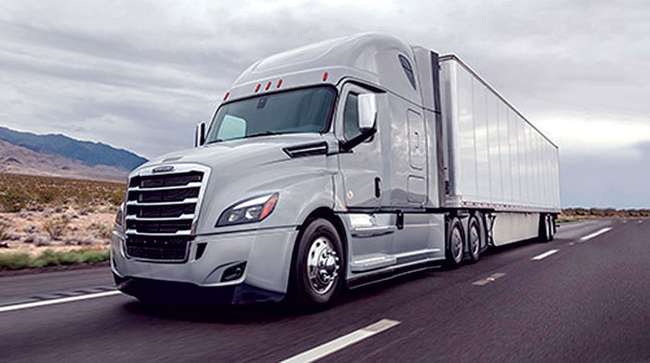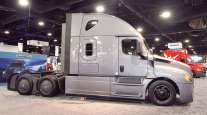Senior Reporter
Class 8 Sales in May Fall to Lowest Point Since 2011

[Ensure you have all the info you need in these unprecedented times. Subscribe now.]
U.S. Class 8 retail sales in May tumbled 62.5% — during the heart of the novel coronavirus pandemic — to just above 9,000 compared with a year earlier, WardsAuto.com reported.
Analysts said Class 8 sales are tallying as expected in a cyclical industry operating in extraordinary circumstances.
Truck sales hit 9,165 for the month, compared with 24,424 a year earlier, according to Wards. May notched the lowest sales since 9,712 in February 2011.
Freight Forecast: Bottoming Process Accelerates, But Latent Capacity Puts Rate Rebound At Riskhttps://t.co/JMNBy1SqrF
— ACT Research (@actresearch) June 11, 2020
“It’s not a horrible number. It’s a fair number under bad conditions,” Don Ake, vice president of commercial vehicles at FTR, told Transport Topics. “It is going to be a long, slow climb back.”
Year-to-date Class 8 sales were 69,379, down 37.7% compared with 111,332 in the 2019 period.
“Given that the industry is still wrestling with the hangover of a near-record two-year stretch of heavy-duty truck sales, which is now compounded by lower than previously expected economic activity for the next year or two, we aren’t expecting to see a V-shaped recovery in Class 8 sales,” said Dan Clark, head of BMO Transportation Finance.
Instead, he forecasts a choppy month-to-month pattern will emerge during the second half of this year, similar to what occurred during the 2016 election year, as the effect of the novel coronavirus pandemic, generally speaking, appears to be easing for trucking.
Since the opening of the Paycheck Protection Program in April, BMO Transportation Finance “facilitated and funded” loans totaling more than $150 million for hundreds of carriers, both large and small, he added.
FTR forecasts U.S. Class 8 retail sales this year to reach 147,000.
“We went into 2020 with very high inventories,” Ake said.
Meanwhile, in accounting there is an underlying principle called “ongoing concern,” said Steve Tam, vice president of ACT Research.

COVID-19 has placed significant strain on many freight networks. So how are third-party logistics providers adapting to meet these challenges? Host Seth Clevenger chats with two 3PL executives who have had firsthand experience contending with this crisis. Hear a snippet, above, and get the full program by going to RoadSigns.TTNews.com.
“These trucking companies have to assume I’m here today, I will be here tomorrow and so will my business. A lot of what we are dealing with now is just noise. It’s another cycle in the industry, although a very different cycle, with a very different catalyst. But a cycle nonetheless.”
Tam added: “So in some ways they have to look past the short term to what the more strategic picture is. So they have to continue to invest in the business if they want it to continue, and, hopefully, grow as well. So they are taking the long view.”
Freightliner posted a leading 33.9% share with 3,104 sales, or 63.6% fewer compared with a year earlier. Freightliner is a brand of Daimler Trucks North America.
“The world has never needed trucks and their operators more than it does right now,” said Tobias Waldeck, head of Daimler Truck Financial, which is offering a range of incentives on new trucks.
Western Star, also a DTNA brand, had a 5.5% share with 504 sales, or 27.5% fewer compared with the 2019 period.
International, a brand of Navistar Inc., earned a 13% share with sales of 1,196, or 62.2% fewer compared with a year earlier.
The truck maker is keeping a close eye on its supply chain.
International has more than 20,000 suppliers, including all the parts suppliers, but the number of active suppliers for production is 1,400 to 1,500, said Persio Lisboa, chief operating officer of Navistar Inc.
Navistar uses analytics to assess risk in the supply chain.
“We can see several layers of the chain, and that provides us a good understanding of where the chain can break, which is typically where you can be compromised with your production flow,” Lisboa said during the company’s most recent earnings conference call.
He said the company recently noticed “increased risk in the top lower quadrants” of suppliers, or 47 suppliers.
It is following “exactly what’s going on with them. We are providing support where we have to provide support,” Lisboa said.
Volvo Trucks North America earned an 11.8% share with 1,084 sales, or 60.2% fewer compared with a year earlier.
Mack Trucks posted a 9.6% share on 879 sales, or 51.5% fewer compared with a year earlier.
Mack’s customers remain committed to buying trucks to support delivering vital services, infrastructure construction and refuse collection, reiterated Jonathan Randall, senior vice president of North American sales at Mack.
VTNA and Mack are brands of Volvo Group.
Kenworth Truck Co. earned the second-highest share, 13.9%, with 1,277 sales, or 65% fewer compared with a year earlier.
Peterbilt Motors Co. notched a 12.2% share with 1,119 sales, or 71% fewer, the biggest decline, compared with the 2019 period.
Want more news? Listen to today's daily briefing:
Subscribe: Apple Podcasts | Spotify | Amazon Alexa | Google Assistant | More




